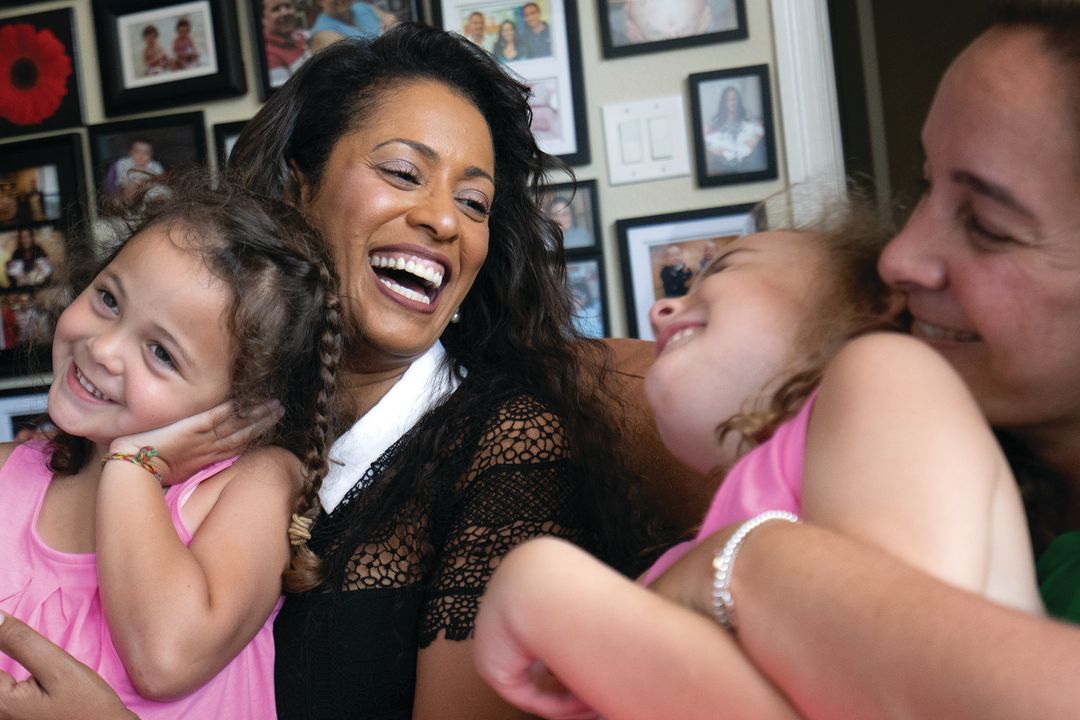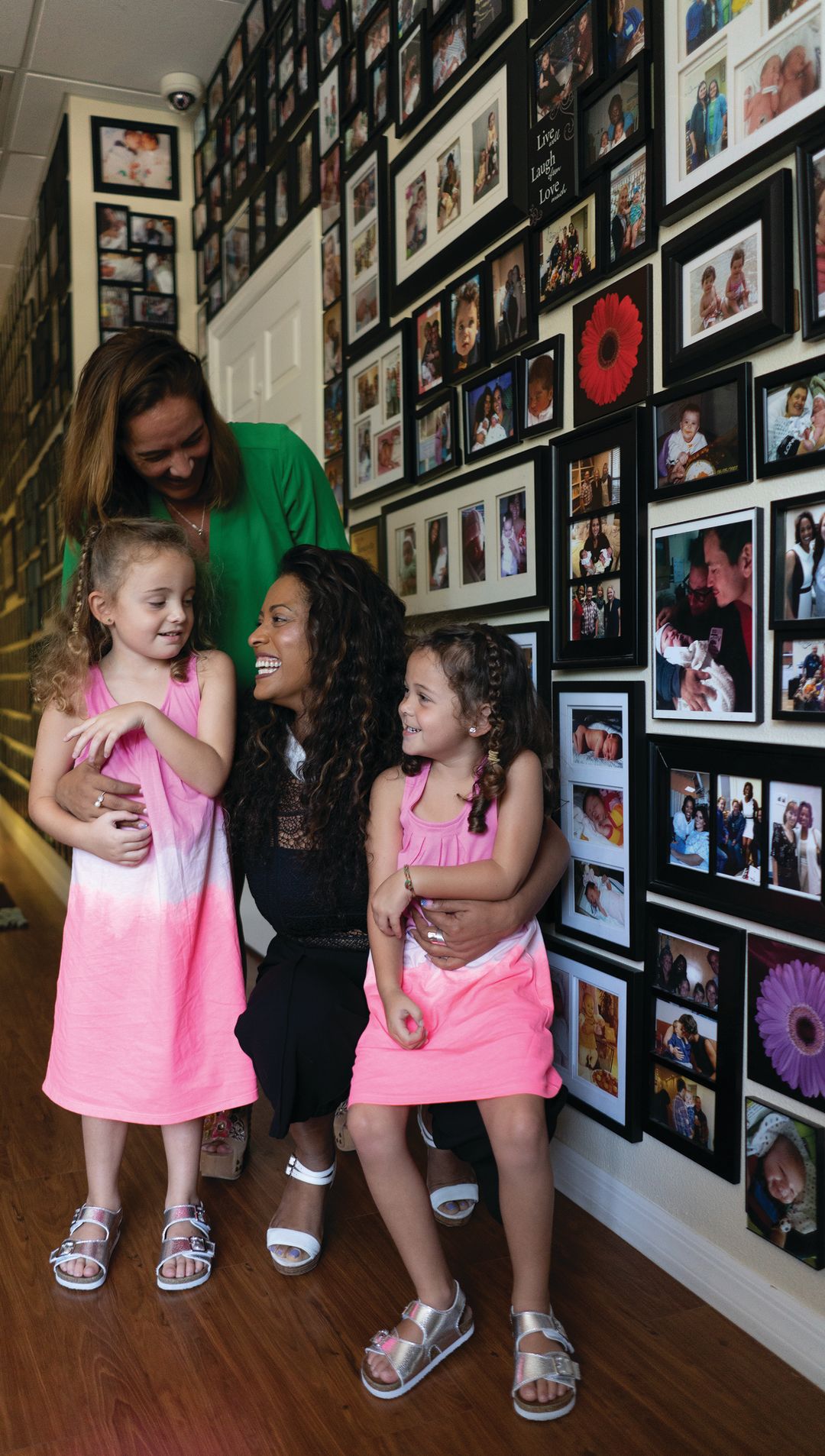Open Arms Surrogacy Celebrates Its 15th Year Helping Couples Who Struggle With Infertility

Five-year-old twins Milena and Celeste, who were born by a surrogate, and their mother Sylvina Sanchez travel from Buenos Aires every year to visit Souad Dreyfus, at left, in her office.
Image: Chris Lake
Souad Dreyfus sat in the delivery room in tears as she watched a first-time dad cradle his son, the first of twin boys, and then hand the newborn to his wife. After the new mother gazed into her son’s eyes, she handed him into the arms of the surrogate who had carried him for nine months. The surrogate looked at the tiny boy, smiled and passed the child onto the nurse so she could deliver his twin.
Only a couple of years before, these new parents had given up on ever having children. A cancer diagnosis had taken the wife’s uterus and ovaries, so they investigated surrogacy, a growing global industry due to medical advances, women beginning families at later ages and increasing cultural acceptance. (Nicole Kidman, Jimmy Fallon and Sarah Jessica Parker are just a few celebrities who have used surrogates.) This couple eventually found Dreyfus, the founder of Bradenton-based Open Arms Surrogacy and Egg Donation, now celebrating its 15th year.
Open Arms restricts its services to gestational surrogacy, which means the baby has no genetic relationship to the woman carrying the embryo, created via in vitro fertilization using the eggs and sperm of the parents or donors. This helps to avoid the majority of issues that result from any bonding that may occur between the surrogate and the baby, and any resulting issues about relinquishing the baby to the parents. In the case of the twins’ parents, donor eggs and the father’s sperm were joined through IVF, and then transferred to a surrogate mother chosen by the couple with Dreyfus’ help.
Open Arms also uses only U.S.-based surrogates; most live within a day’s driving distance of its Bradenton office. Surrogacy is a complicated process that can take up to two years. The parents—or parent, since some are single—choose a fertility specialist, secure legal assistance, find a compatible surrogate, and then work closely with all parties throughout the process.
“We take care of all the details, like making sure the birth certificate is issued correctly and all the surrogate’s bills are paid. We form a bond with the parents and surrogates, and they often form a bond with each other. It’s hard not to,” Dreyfus says.
There is no typical surrogacy client. “Infertility doesn’t discriminate, and neither does the desire to have a baby,” Dreyfus says.
Prospective parents seeking help from Open Arms are from all parts of the world. The $125,000 to upwards of $150,000 price tag suggests they are either affluent or willing to stake what could be their life savings on a procedure that, according to Dreyfus, has a 60 percent success rate, about the same reported by the nation’s top IVF clinics for fresh (not frozen) embryos. Open Arms clients are heterosexual couples, same-sex couples, single women and single men, both gay and straight. The consultancy even has famous clients, like acclaimed Argentine dancer and choreographer Flavio Mendoza, who welcomed his baby boy through a surrogate last March.
Dreyfus knows that surrogacy has detractors. Many developed nations, including Canada, Denmark, New Zealand, the U.K. and most of Australia, ban for-profit surrogacy, although they allow some form of altruistic surrogacy, where the practice is allowed as long as the surrogate is not compensated. In the U.S., the legality of surrogacy is determined by each state. Florida’s surrogacy laws are among the most lenient.

Dreyfus and the Sanchezes next to Dreyfus' photo wall of Open Arms’ families.
Image: Chris Lake
Critics often cite exploitation of low-income women, and the United Nations Committee on the Rights of the Child has said that commercial surrogacy, if not regulated, amounts to the sale of children. Dreyfus says critics are uninformed at best, and lacking compassion at worst. “Many of our clients have struggled with infertility for years. Many have had cancer," she says. "One of our clients was born without a uterus. The doctors were able to retrieve her eggs, and she and her husband were able to have a baby through surrogacy.”
Dreyfus also points out that alternatives like adoption are not open to all of her clients. “They’ve run into obstacles like borders being closed to international adoptions or laws that discriminate against the LGBT community,” she says.
Surrogate mothers, who can earn $35,000 to $50,000 or more per pregnancy, range in age from 22 to 42. They must have had a previous uncomplicated pregnancy, be physically and mentally healthy, and have a good support system. The typical surrogate is educated and comes from a middle-class background.
“We make sure the women are doing it for the right reasons. Surrogacy cannot be their sole source of income,” Dreyfus says.
While she takes joy in knowing that her services have helped hundreds of people become parents, Dreyfus also acknowledges that the profession can be full of heartache.
“The hardest part is when you put all the pieces together and it still doesn’t work,” Dreyfus says. “It makes you start doubting why you are doing this. But we are not God. You do the best you can to put the right people in each other’s paths.”